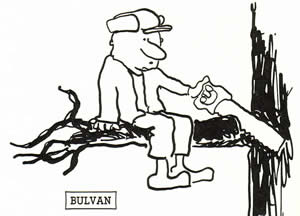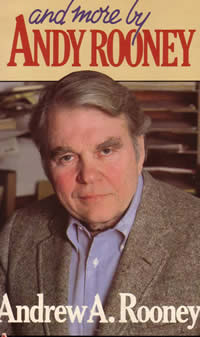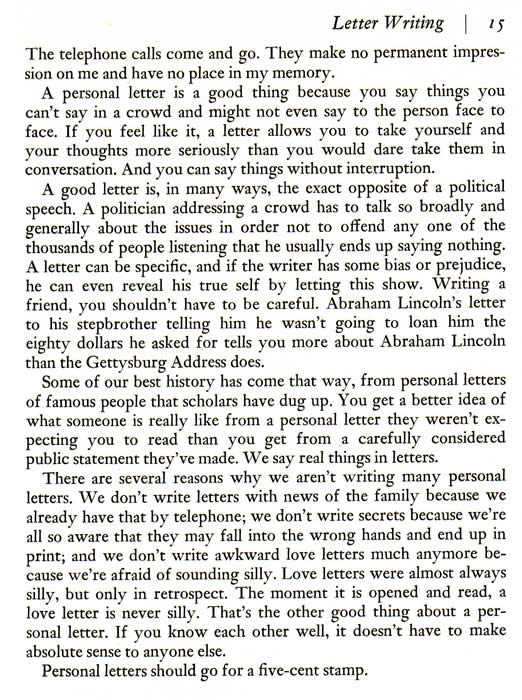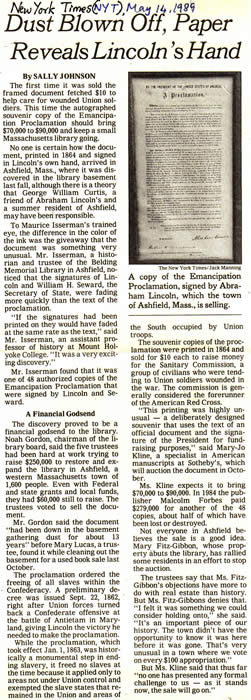Ilankai Tamil Sangam30th Year on the Web Association of Tamils of Sri Lanka in the USA |
|||
 Home Home Archives Archives |
Abdul Kalam Proves Andy Rooney PredictionA rejoinderby Sachi Sri Kantha, February 10, 2012
The 30-year old column of Andy Rooney which I brought to focus in criticizing Abdul Kalam’s lectures has been tagged as an inappropriate choice. I assert that it was not out of context. To keep the focus of my critique, I limited my quotation from Andy Rooney to only two sentences. Yes, prediction is the correct word here. The New Oxford American Dictionary (2001, p. 1343)) defines prediction as follows: Prediction: n. a thing predicted; a forecast. The action of predicting something. Origin: mid 16th cent. From Latin pradictio (n) from praedicere ‘make known beforehand’. Andy Rooney (1919-2011) was older to Abdul Kalam (born 1931). Thirty years ago, in his column entitled ‘Letter Writing’ he predicted how a politician’s listless talk differs from a personal letter. When he wrote that column, he was Irrespective of whether bulvan critics will be convinced or not, I reproduce for the benefit of other readers, the second half (5 paragraphs) of Andy Rooney’s entire column for three reasons. First, what Rooney mentions about Abraham Lincoln (the politician) in the succeeding lines of his same column, provide evidence from the 19th century events. Thus, Andy Rooney’s prediction was based on solid proof. Secondly, in my view, it was one of the best columns this humorist wrote, and I consider him as one of my tutors in American English. Thirdly, he wrote this column to protest the then postal rate hike to 20 cents stamp for a regular letter. He ended his column with a punch to postal authorities: “Personal letters should go for a five-cent stamp.” Andy Rooney’s column – the second half Here is Andy Rooney. [I provide in italics, the sentence which I had quoted in my critique of Abdul Kalam’s lectures]:
Abraham Lincoln’s 1862 Letter preceding the 1863 Emancipation Proclamation Andy Rooney’s comments about Abraham Lincoln, the politician, behavior is opportune indeed. There is this famous letter Lincoln wrote to Horace Greeley, the New York journalist on August 22, 1862. In it, Lincoln indicated his bias. What was it? Lincoln’s paramount objective (as a politician) was to “save the Union”, and Emancipation of the Slaves was secondary! Here are Lincoln’s words:
Here are the important dates which followed the August 22, 1862 letter to Mr. Greeley. Sept.17, 1862: Battle of Antietam, Maryland. Sept.22, 1862: Preliminary Emancipation Proclamation issued. Jan. 1, 1863: Emancipation Proclamation Issued. Historians have recorded that, “Lincoln had postponed issuing the [Emancipation] document until the Union had scored a significant victory, such as that at Antietam, because he feared that premature release would be misinterpreted as an act of desperation.” [William Degregorio, The Complete Book of U.S. Presidents, 1991, p. 239] In 1989, when I was living in Philadelphia, one of the 48 authorized copies of the Emancipation Proclamation signed by Lincoln was sold in an auction. I provide a scan of the May 14, 1989 New York Times news item nearby about this sale. It also reiterates the fact which I had already stated. Excerpt: “A preliminary decree was issued Sept.22, 1862, right after Union forces turned back a Confederate offensive at the battle of Antietam in Maryland, giving Lincoln the victory he needed to make the proclamation. While the proclamation, which took effect Jan.1, 1863, was historically a monumental step in ending slavery, it freed no slaves at the time because it applied only to areas not under Union control and exempted the slave states that remained in the Union and areas of the South occupied by Union troops.”
Later, following Lincoln’s tragic assassination in 1865, hagiographers had promoted Lincoln vigorously as the foremost emancipator of slaves. This had been repeated ad-nauseam without proper clarification of facts by historians and text books. Even Abdul Kalam in his lecture delivered at the BMICH on January 21, 2012 had referred to it. But the real fact remains, that Lincoln’s ‘paramount’ objective as a politician was to save the American Union by this deed, and his 1862 letter to Horace Greeley provided the foremost proof for his conviction. Deliberate misreading of My Previous Commentary I also wish to note that this particular bulvan critic had deliberately misread my previous commentary. To suit his fancy, he had written:
Who advocated that Abdul Kalam should not visit Jaffna and should not deliver lectures? If this critic bothers to re-read my previous text, there’s nothing to press that I have advocated against Abdul Kalam’s visit to Jaffna. In fact, I have clearly indicated in the first paragraph of my commentary, “For his status and age, I do respect him. But, when he opted to wear a political cloak and hat on his own discretion to play-act as a naïve dunce, he is fair game to criticism.” My criticism was based solely on the speeches he delivered in Sri Lanka. Nevertheless, I do appreciate Abdul Kalam’s gesture in promptly posting the texts of his lectures in his website, for the benefit of those who couldn’t attend in person. If he hadn’t done this, I’d have no means to promptly verify what message he did deliver to his Sri Lankan audience. The bulvan critic had failed to rebut my main charges that, (1) Abdul Kalam should be a hypocrite (the anointed Missile Man of India) speaking about nonviolence of Emperor Asoka to his Jaffna audience, (2) Why Abdul Kalam failed to speak about the nonviolence of Emperor Asoka to his predominantly Buddhist Colombo audiences? (3) Did Abdul Kalam contribute his might (when he had power), to stall the violent aggression of India’s RAW operatives against the Eelam Tamils and the tilt of India’s Congress Party policy makers towards Colombo’s racist regime? *****
|
||
|
|||
 It’s no surprise that Tamils as an ethnic group have their share of bulvan critics. Here is one ranting comment. To my review of A.P.J.Abdul Kalam’s seven lectures delivered in Sri Lanka last month, this guy had commented,
It’s no surprise that Tamils as an ethnic group have their share of bulvan critics. Here is one ranting comment. To my review of A.P.J.Abdul Kalam’s seven lectures delivered in Sri Lanka last month, this guy had commented, generalizing about a politician’s behavior, irrespective of whether the politician is an American, or an Indian or an Italian or an Irish. He was also not aware that Abdul Kalam (with his scientific background, would later become an Indian President, and would present himself as politician in Sri Lanka in 2012). Thus, my choice of Andy Rooney’s prediction is not in error.
generalizing about a politician’s behavior, irrespective of whether the politician is an American, or an Indian or an Italian or an Irish. He was also not aware that Abdul Kalam (with his scientific background, would later become an Indian President, and would present himself as politician in Sri Lanka in 2012). Thus, my choice of Andy Rooney’s prediction is not in error. 
